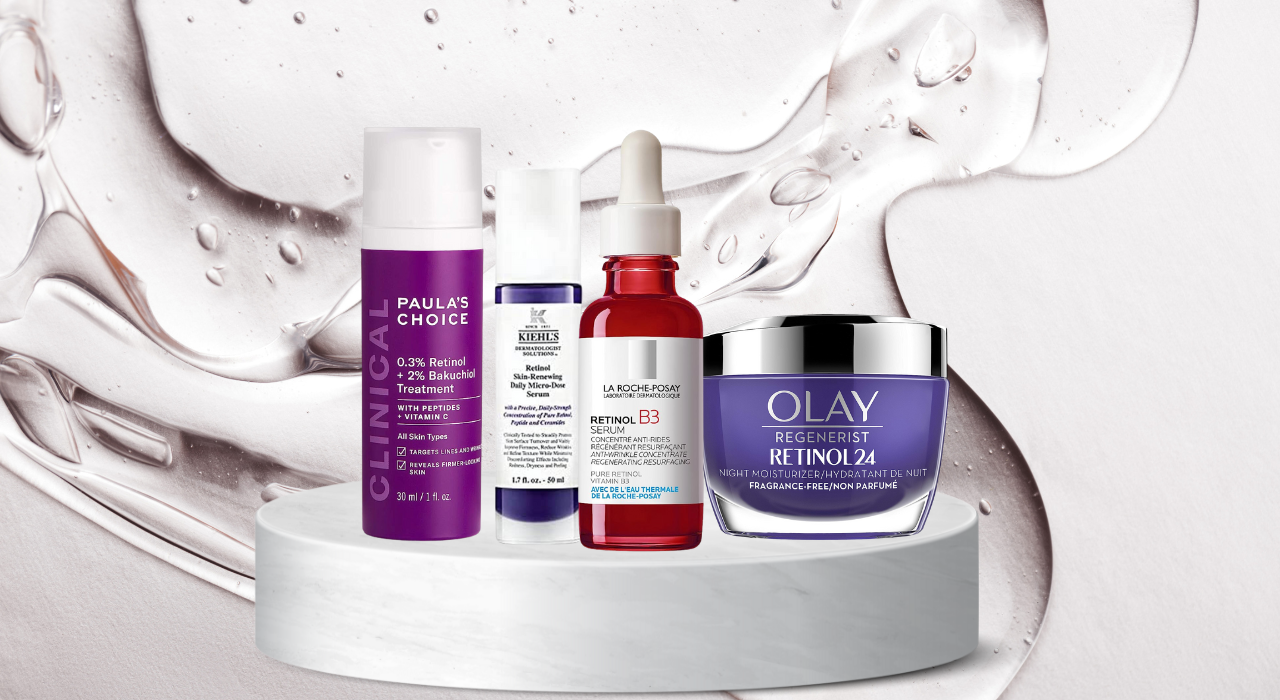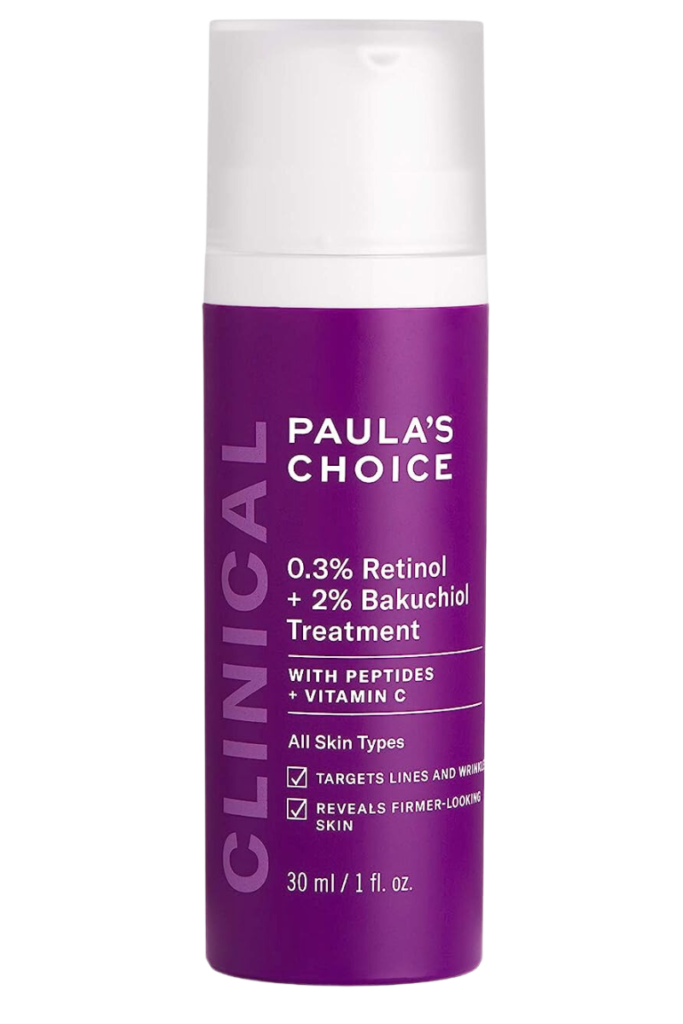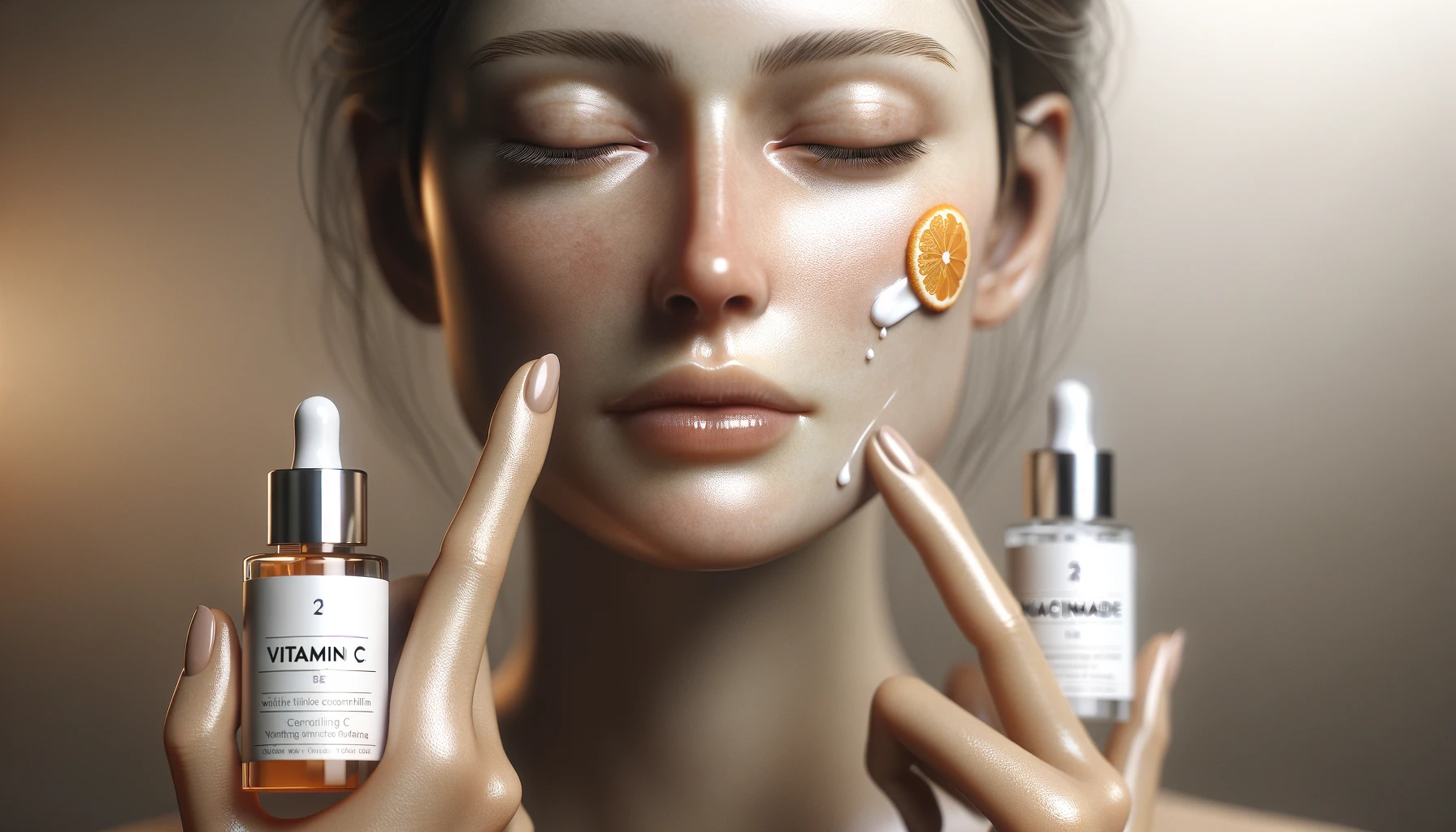The Ultimate Guide to Retinol: Understanding, Benefits, and Best Products
Welcome to the ultimate guide to retinol! In this comprehensive article, we’ll explore everything you need to know about retinol, including its definition, benefits, and an in-depth review of the different retinol products available on the market. From retinol creams to serums, we’ll cover the best brands, the specific concerns they address, and how to effectively incorporate retinol into your skincare routine. So, let’s dive in!
1. What is Retinol?
Retinol is a powerful derivative of vitamin A that offers numerous benefits for the skin. It is commonly found in skincare products and is known for its ability to improve the appearance of fine lines, wrinkles and acne. Retinol works by stimulating collagen production, increasing cell turnover, and promoting an even complexion. Its molecular structure allows it to penetrate deep into the skin, making it a highly effective anti-aging and acne-fighting ingredient.
2. Understanding the Benefits of Retinol
Retinol offers a wide range of benefits for the skin. Let’s explore two primary areas where retinol shines:
2.1 Retinol for Skin Aging
Retinol is known for its anti-aging properties. By stimulating collagen production and accelerating cell turnover, retinol helps reduce the appearance of fine lines, wrinkles and age spots. It also improves skin elasticity and firmness, resulting in a more youthful and radiant skin tone. With continued use, retinol can effectively combat the signs of aging and improve skin’s overall texture and tone.
2.2 Retinol for Acne Treatment
Retinol is also highly effective in treating acne. Its exfoliating properties unclog pores, reduce inflammation, and regulate oil production, making it beneficial for those struggling with acne-prone skin. Retinol can help reduce the appearance of breakouts, fade acne scars, and promote a clear complexion. It’s a versatile ingredient that addresses multiple factors that contribute to acne, making it a valuable addition to any skincare routine.
3. Exploring Different Retinol Products
Now that we understand the remarkable benefits of retinol let’s delve into the diverse range of retinol products available in the market. Here are some key categories and products worth exploring:
3.1 Retinol Creams
Retinol creams are a popular choice for adding retinol to a skin care routine. They are available in different strengths and formulations, making them suitable for different skin types. When choosing a retinol cream, consider your specific skin care concerns and the concentration of retinol that best suits your needs. Look for creams that are well tolerated and offer moisturizing benefits to minimize potential side effects.
3.2 Retinol Serums
Retinol serums are lightweight and easily absorbed by the skin, making them a preferred option for many. They deliver a concentrated dose of retinol and are often combined with other beneficial ingredients such as hyaluronic acid and antioxidants. Retinol serums are particularly effective for targeting specific concerns like fine lines, uneven skin tone, and texture irregularities.
4. Best Retinol Serums for Visible Results
To achieve visible results, consider incorporating the following retinol serums into your skincare routine:
4.1 Sunday Riley A+ High-Dose Retinoid Serum (Best Retinol Serum)
The Sunday Riley A+ High-Dose Retinoid Serum is a powerful retinol treatment that delivers visible results. It contains a high concentration of retinoids to target fine lines, wrinkles, and uneven skin texture. This serum is also enriched with botanical extracts and oils to soothe and nourish the skin, providing a comprehensive anti-aging solution.
4.2 Cerave Resurfacing Retinol Serum (Best Cerave Retinol Serum)
The Cerave Resurfacing Retinol Serum is a budget-friendly option that offers impressive results. It features encapsulated retinol to promote gentle and gradual release, minimizing potential irritation. This serum is suitable for all skin types and helps improve skin texture, diminish the appearance of pores, and enhance overall skin radiance.
4.3 Kiehl’s Retinol Serum (Best Kiehl’s Retinol Serum)
Kiehl’s offers a range of retinol serums, and their products are highly regarded for their quality and efficacy. The specific retinol serum from Kiehl’s that best suits your skin type can depend on individual preferences and concerns. Explore their retinol serum options, including different concentrations and formulations, to find the one that addresses your specific skincare needs.
These serums have garnered positive reviews and have been proven effective in improving various skin concerns.
5. Tretinoin vs. Retinol: Understanding the Difference
Tretinoin and retinol are both derived from vitamin A and have similar benefits for the skin. However, there are some key differences between them. Tretinoin is a prescription-strength retinoid that is more potent than over-the-counter retinol. It is commonly used for treating severe acne and requires a dermatologist’s prescription. On the other hand, retinol is available over-the-counter and is milder, making it suitable for those with sensitive skin or beginners to retinol.
The Ultimate Guide to Retinol: Understanding, Benefits, and Best Products
Best Retinol Creams for Different Skin Types
When choosing a retinol cream, it’s essential to consider your skin type and specific concerns. Here are some recommendations for the best retinol creams based on different skin types:
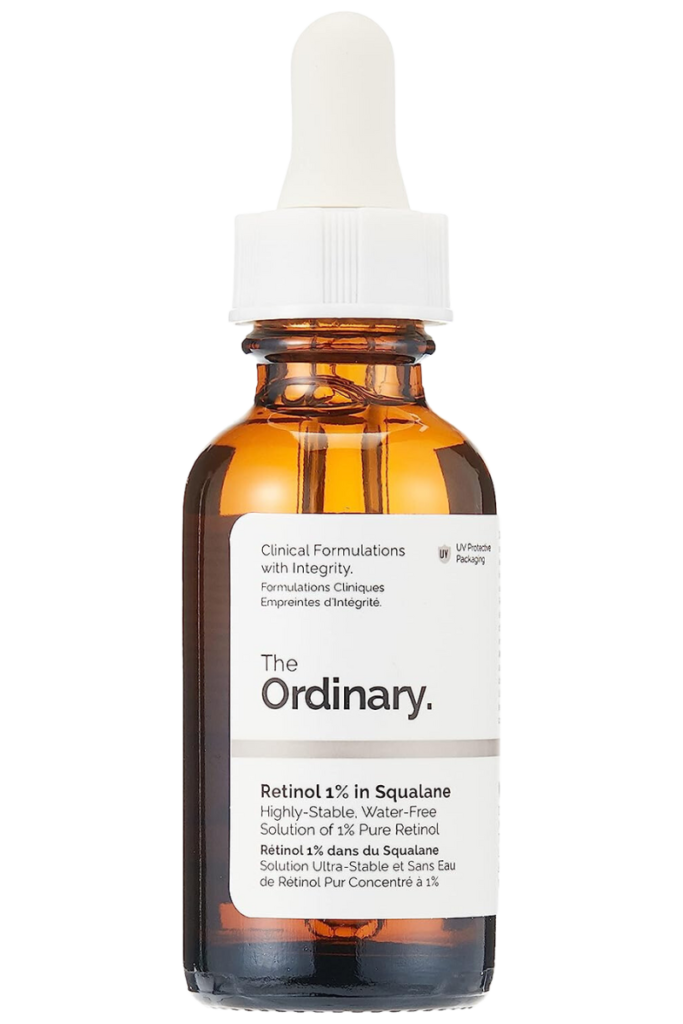
The Ordinary Retinol
- Why we love it: The Ordinary Retinol is popular for its affordable price and wide range of strengths available. It helps to reduce the appearance of fine lines, wrinkles, and uneven skin tone.
- Key ingredients: Retinol and squalane.
- Best for: The Ordinary Retinol is suitable for most skin types, but it is important to start with a lower strength if you have sensitive skin.
- How to apply: Apply a small amount to clean, dry skin in the evening. Begin with a low strength and gradually increase frequency and strength as tolerated. Follow up with a moisturizer.
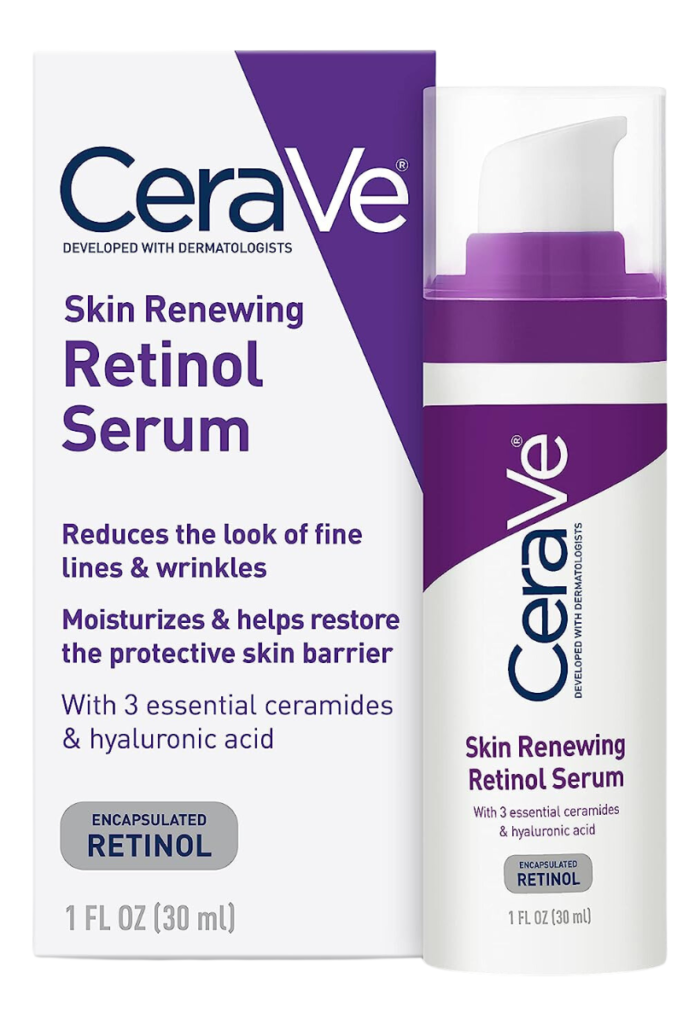
CeraVe Retinol
- Why we love it: CeraVe Retinol is loved for its gentle yet effective formula that contains encapsulated retinol, ceramides, and hyaluronic acid. It helps to reduce the appearance of fine lines, wrinkles, and uneven skin tone while also providing hydration and improving the skin’s texture.
- Key ingredients: Encapsulated retinol, ceramides, and hyaluronic acid.
- Best for: CeraVe Retinol is suitable for all skin types, including sensitive skin.
- How to apply: Apply a pea-sized amount of the product to clean, dry skin in the evening. Start by using it once or twice a week and gradually increase frequency as tolerated. Follow up with a moisturizer.
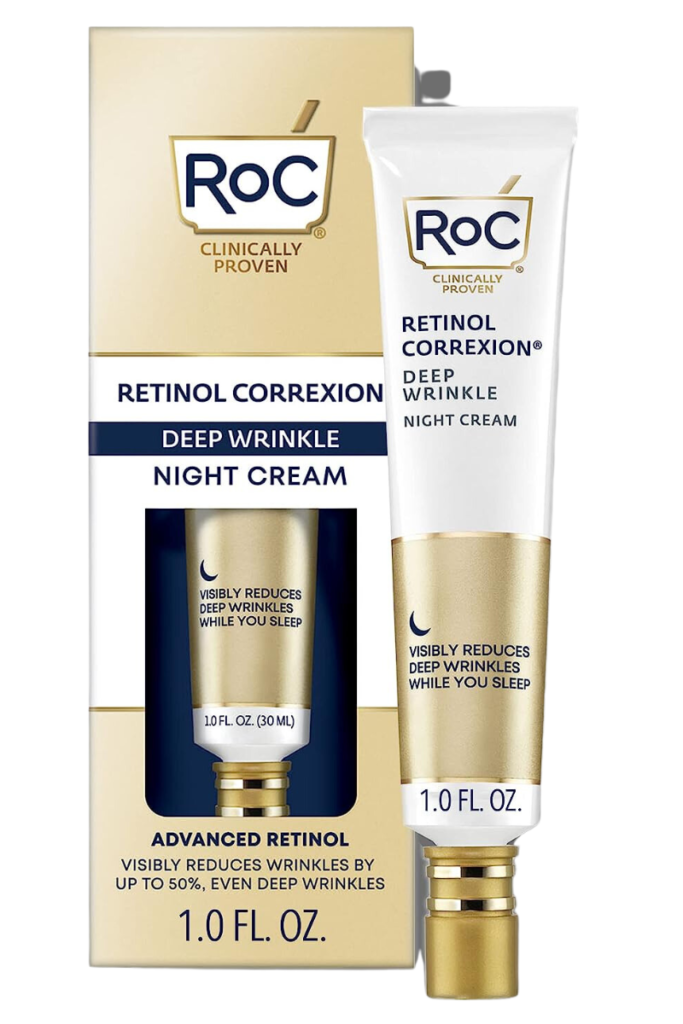
Roc Retinol
- Why we love it: RoC Retinol is loved for its potent retinol formula that effectively reduces the appearance of wrinkles and improves skin texture.
- Key ingredients: Retinol and various moisturizing and soothing ingredients, such as glycerin and shea butter.
- Best for: RoC Retinol is suitable for normal to dry skin types.
- How to apply: Apply a small amount to clean, dry skin in the evening. Start with a lower concentration and gradually increase usage. Follow up with a moisturizer.
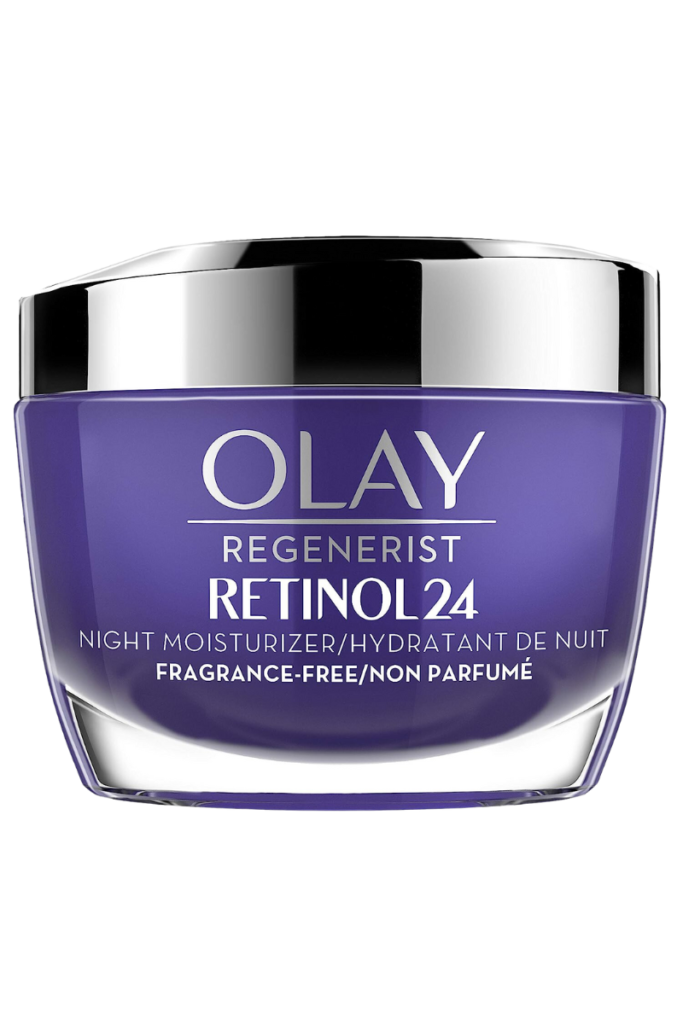
Olay Regenerist Retinol 24
- Why we love it: RoC Retinol is loved for its potent retinol formula that effectively reduces the appearance of wrinkles and improves skin texture.
- Key ingredients: Retinol and various moisturizing and soothing ingredients, such as glycerin and shea butter.
- Best for: RoC Retinol is suitable for normal to dry skin types.
- How to apply: Apply a small amount to clean, dry skin in the evening. Start with a lower concentration and gradually increase usage. Follow up with a moisturizer.
Paula’s Choice Retinol
- Why we love it: Paula’s Choice Retinol is highly regarded for its stable and effective retinol formulas that address various skin concerns, such as fine lines, wrinkles, and uneven skin tone.
- Key ingredients: Hyaluronic Acid, Vitamin C, Ceramides, Retinol, antioxidants, and skin-replenishing ingredients.
- Best for: Paula’s Choice Retinol is suitable for all skin types, including sensitive skin.
- How to apply: Apply a pea-sized amount to clean, dry skin in the evening. Begin with a low strength and gradually increase frequency and strength as tolerated. Follow up with a moisturizer.
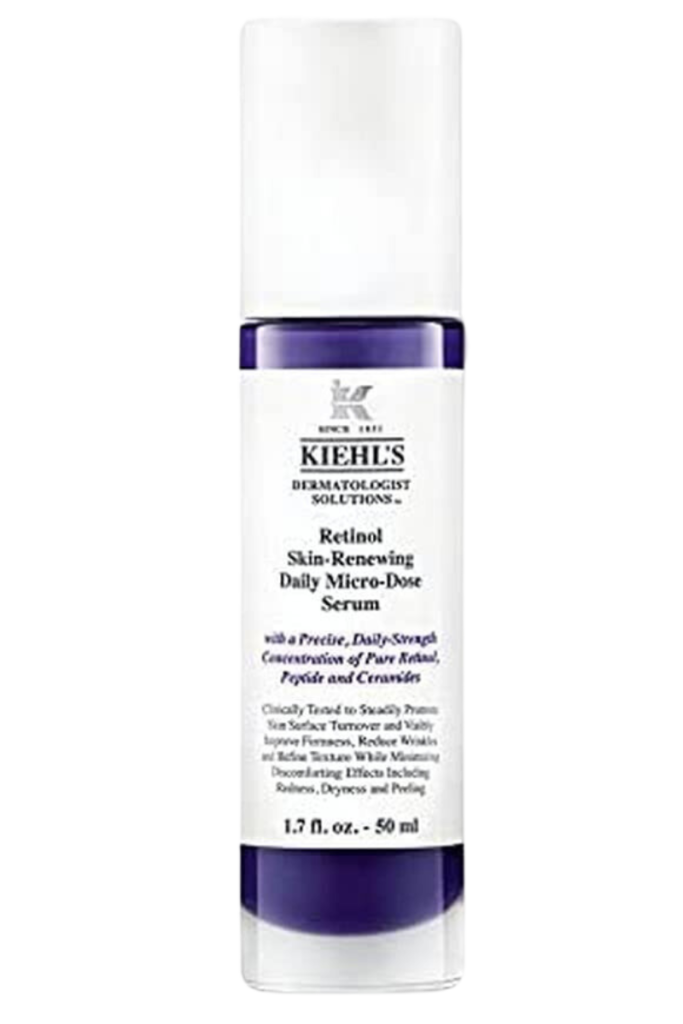
Kiehl’s Retinol
- Why we love it: Kiehl’s Retinol products are praised for their effective retinol formulas that help to reduce the appearance of fine lines, wrinkles, and uneven skin texture.
- Key ingredients: Retinol and various nourishing and hydrating ingredients.
- Best for: Kiehl’s Retinol is suitable for normal to dry skin types.
- How to apply: Apply a small amount to clean, dry skin in the evening. Start with a lower concentration and gradually increase usage. Follow up with a moisturizer.
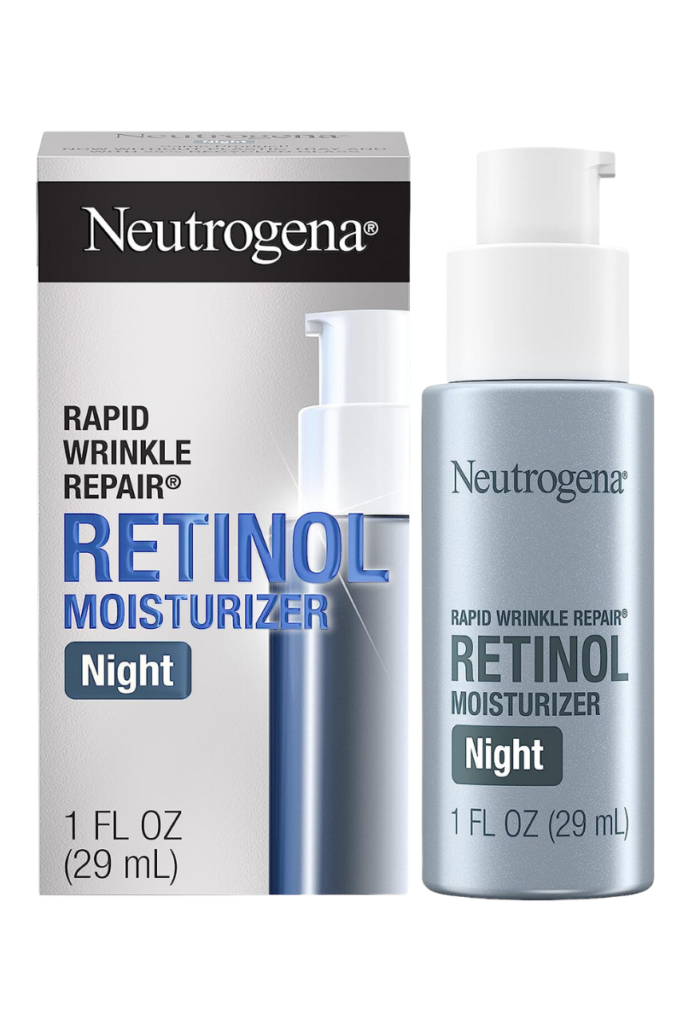
Neutrogena Retinol
- Why we love it: Neutrogena Retinol products are appreciated for their accessible and effective retinol formulas that target fine lines, wrinkles, and uneven skin tone.
- Key ingredients: Retinol, hyaluronic acid, and various emollients.
- Best for: Neutrogena Retinol is suitable for most skin types.
- How to apply: Apply a pea-sized amount to clean, dry skin in the evening. Begin with a low strength and gradually increase frequency and strength as tolerated. Follow up with a moisturizer.
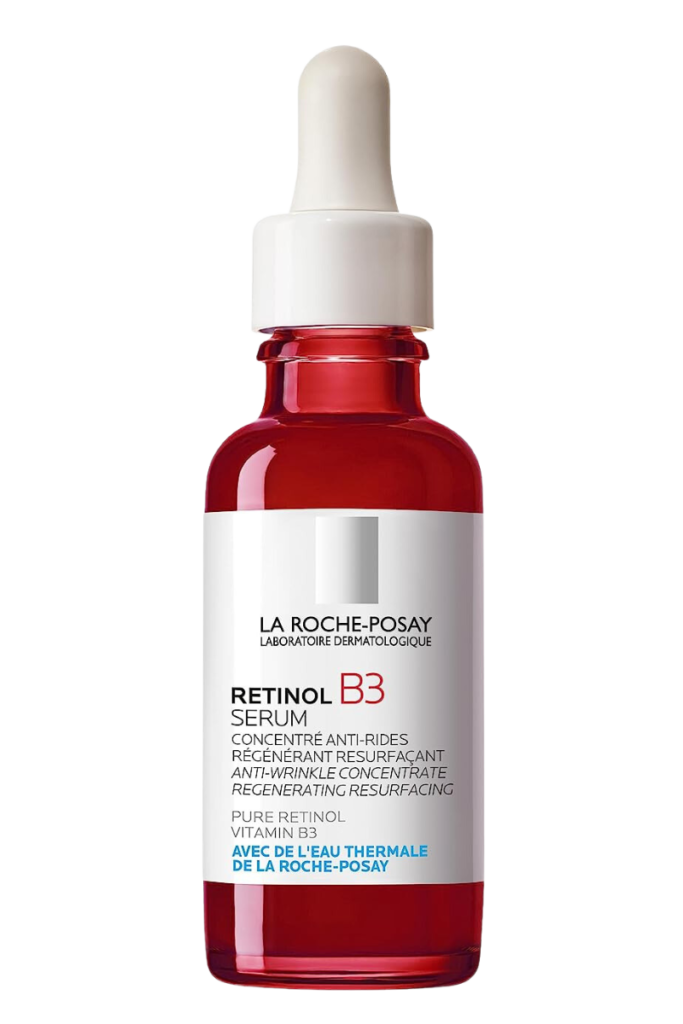
La Roche-Posay Retinol
- Why we love it: La Roche-Posay Retinol products are highly regarded for their well-tolerated and effective retinol formulas that address signs of aging, such as fine lines and wrinkles.
- Key ingredients: Retinol and various soothing and hydrating ingredients.
- Best for: La Roche-Posay Retinol is suitable for most skin types, including sensitive skin.
- How to apply: Apply a pea-sized amount to clean, dry skin in the evening. Start with a low concentration and gradually increase usage. Follow up with a moisturizer.
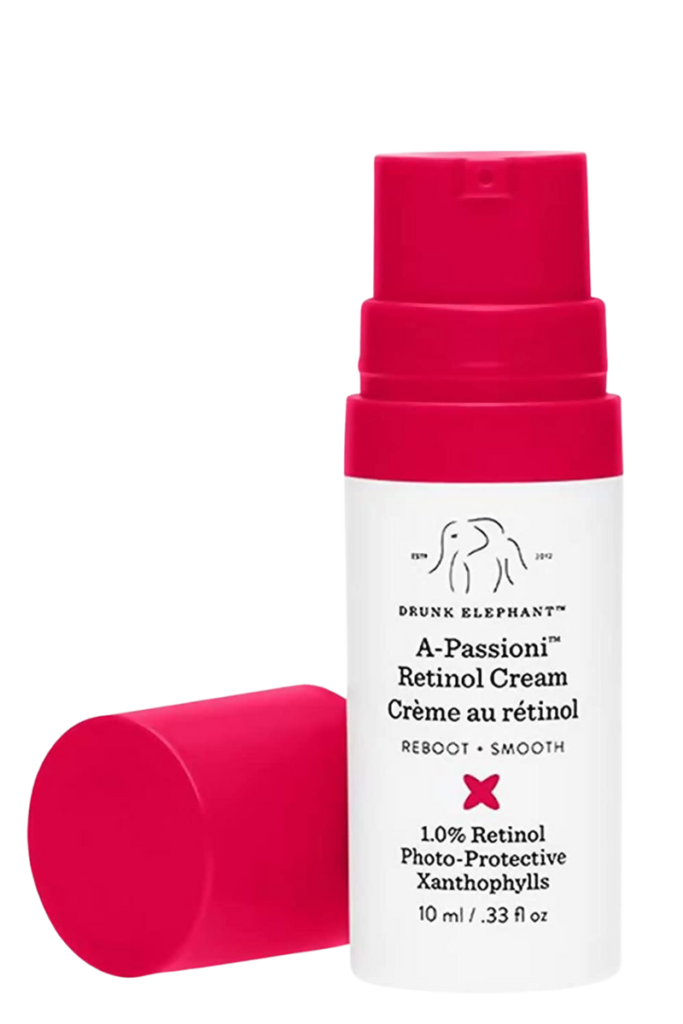
Drunk Elephant Retinol
- Why we love it: Drunk Elephant Retinol is loved for its clean and effective retinol formulas that help to minimize the appearance of fine lines, wrinkles, and sun damage.
- Key ingredients: Retinol, peptides, and nourishing plant oils.
- Best for: Drunk Elephant Retinol is suitable for most skin types.
- How to apply: Apply a pea-sized amount to clean, dry skin in the evening. Start with a low strength and gradually increase usage. Follow up with a moisturizer.
Retinol and Retinoid: Understanding the Distinctions
While the terms “retinol” and “retinoid” are often used interchangeably, they are not the same.
Retinol is a specific form of retinoid, encompassing a broader category of compounds with similar characteristics. Retinoids are a class of compounds derived from vitamin A, and retinol is one of the most commonly used retinoids in skincare products. Other retinoids, such as tretinoin and adapalene, offer specific benefits and require a prescription.
9. Retinol for Acne: Combating Breakouts
Retinol’s exfoliating and pore-clearing properties make it an excellent ingredient for combating breakouts. It helps unclog pores, reduce inflammation, and regulate oil production, all of which contribute to clearer skin. If you struggle with acne, incorporating retinol into your skincare routine can be beneficial in reducing breakouts and improving overall skin health.
10 How to Use Retinol Safely and Effectively
To use retinol safely and effectively, consider the following guidelines:
- Start with a low concentration: If you’re new to retinol, begin with a low concentration to allow your skin to adjust gradually.
- Patch test: Before applying retinol to your entire face, perform a patch test to check for any adverse reactions.
- Use at night: Retinol can make your skin more sensitive to sunlight, so it’s best to apply it at night and wear sunscreen during the day.
- Apply to dry skin: Apply retinol to clean, dry skin to maximize its absorption and effectiveness.
- Moisturize: To minimize potential dryness or irritation, follow up with a moisturizer after applying retinol.
- Be consistent: Consistency is key with retinol. For optimal results, it is important to make retinol a regular part of your skincare routine.
- Consult a dermatologist: If you have any specific concerns or questions, consult a dermatologist for personalized advice.
11. Prescription Retinol: When to Consider
In some cases, a prescription retinol, such as tretinoin, may be recommended. Prescription retinol is often used for severe acne or certain skin conditions. If over-the-counter retinol products are not providing the desired results, consult a dermatologist about whether prescription retinol is right for your needs.
12. Retinol and Vitamin C: A Powerful Skincare Combination
Retinol and vitamin C are powerful ingredients that offer remarkable benefits when used together. Vitamin C provides antioxidant protection, brightens skin, and helps fade pigmentation, while retinol fights signs of aging and improves overall skin texture. When used in combination, these ingredients can enhance each other’s effectiveness, resulting in a more youthful and radiant complexion.
Retinol Before and After: Realistic Expectations
When using retinol, it’s important to have realistic expectations. Results may vary depending on individual factors, and retinol must be given time to work. In general, significant improvement can be seen after several weeks of continuous use. However, it’s important to note that everyone’s skin is unique, and individual responses to retinol may vary.
Summary
Finally, retinol is a powerful ingredient that offers numerous benefits for the skin. From reducing signs of aging to addressing acne concerns, retinol has become a staple in many skin care routines. By understanding the benefits of retinol and exploring different product options, you can find the best retinol product for your specific needs. Remember to use retinol safely and consistently, and consult a dermatologist if you have any concerns or questions.
Find more insightful articles and skincare tips at Dailypathways.com
FAQs (Frequently Asked Questions)
- Is retinol suitable for sensitive skin?
Retinol can be suitable for sensitive skin, but it’s important to start with a low concentration and gradually increase usage to minimize potential irritation. Patch testing is also recommended to check for any adverse reactions. - Can I use retinol during pregnancy or while breastfeeding?
It is generally recommended to avoid retinol during pregnancy and while breastfeeding. Consult with a healthcare professional for personalized advice. - How long does it take to see results from using retinol?
Visible results from using retinol can vary depending on individual factors. Generally, it may take several weeks to notice significant improvements in the skin’s texture and appearance. - Can I use retinol on my body?
Yes, retinol can be used on the body. There are specific retinol body lotions available that help address concerns such as dryness, roughness, and signs of aging on the body. - What are the potential side effects of using retinol?
Potential side effects of using retinol may include dryness, redness, and skin peeling. These effects are usually mild and can be minimized by starting with a low concentration and gradually increasing usage. - Can I use retinol and other active ingredients together?
Yes, retinol can be used in combination with other active ingredients. However, it’s important to introduce new products gradually and monitor your skin’s response to avoid overexfoliation or irritation. - How often should I apply retinol?
The frequency of retinol application depends on the product’s concentration and your skin’s tolerance. Start with 2-3 times a week and gradually increase usage if well-tolerated. - Can retinol be used during the day?
Retinol is generally recommended for nighttime use due to its potential to increase skin sensitivity to sunlight. However, if you choose to use retinol during the day, make sure to apply a broad-spectrum sunscreen with a high SPF to protect your skin. - Are there any age restrictions for using retinol?
There are no specific age restrictions for using retinol. However, individuals with younger or more sensitive skin may start with lower concentrations and adjust usage based on their skin’s response. - Can retinol help with hyperpigmentation?
Retinol can help improve hyperpigmentation by promoting cell turnover and fading dark spots over time. However, it’s important to use sunscreen and practice sun protection to prevent further pigmentation issues.
